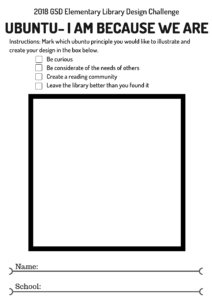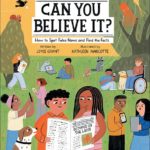Lesson #2 – Introduction to Four Principles and 2018 GSD Design Challenge
Summary
This lesson will introduce students to the four principles of ubuntu and the 2018 GSD Design Challenge
Main Core Tie
Elementary Library Media, Strand 1- Reading for intellectual, personal, and emotional growth.
Time Frame
15-30 minutes
Background
Lesson #1 – Introduction to Library Yearly Theme – Ubuntu
Intended Learning Outcomes
Kindergarten-Grade 2:
- Students will understand the principles of ubuntu in the library
- Students will be able to give examples of how to participate in the library and how to be compassionate, friendly, and caring in the library
- Students will be able to illustrate one principle of ubuntu in the library
Grade 3-Grade 6:
- Students will understand the principles of ubuntu in the library
- Students will understand how the four principles of ubuntu in the library relate to the four characteristics of ubuntu that are described by Desmond Tutu
- Students will be able to illustrate one principle of ubuntu in the library
Instructional Procedures
Kindergarten-Grade 2
Presentation: https://docs.google.com/presentation/d/1vkb_-Nwo3jNvB37eBMmeR39KCmpWunmaYZQcbarEhrc/edit?usp=sharing
- Recite the quote from Desmond Tutu on Slide 2
- Ask students to point out the words in red font and encourage students to make an educated guess on what each word means
- Explain to students that the word ‘compassionate’ connects to the first principle of ubuntu, ‘Be curious’
- Explain to students what it means to be ‘compassionate’ and that there is a series of books written by Margret and H.A. Rey about a monkey who is always interested in learning new things and shows concern for others
- Ask students if anyone knows who that character is (Curious George) and ask them the following questions,
- Why is Curious George known as ‘curious’?
- How is Curious George compassionate?
- Explain to students what the word ‘friendly’ connects to the second principle of ubuntu, ‘Be considers of the needs of others’
- Explain to students what it means to be ‘friendly’ and that there is a famous character from a book written by Roald Dahl that is the perfect example of the second principle of ubuntu
- Ask students if they know who that character is (the BFG) and ask them the following questions,
- Why is the BFG described as ‘friendly’?
- What actions does the BFG take to show interest in others?
- Explain to students that the word ‘participate’ connects to the third principle of ubuntu, ‘Create a reading community’
- Explain to students what it means to ‘participate’
- Share the following description for the book The Wild Robot by Peter Brown,
- Can a robot survive in the wilderness? When robot Roz opens her eyes for the first time, she discovers that she is alone on a remote, wild island. She has no idea how she got there or what her purpose is–but she knows she needs to survive. After battling a fierce storm and escaping a vicious bear attack, she realizes that her only hope for survival is to adapt to her surroundings and learn from the island’s unwelcoming animal inhabitants. As Roz slowly befriends the animals, the island starts to feel like home–until, one day, the robot’s mysterious past comes back to haunt her.
- Read aloud Chapter 20 from The Wild Robot by Peter Brown
- Ask students to answer the following questions,
- In which ways do you think paying attention and listening helped Roz understand and help her community?
- How do you think Roz will participate in the island community?
- Explain to students that the word ‘caring’ connects to the fourth principle of ubuntu, ‘Leave the library better than you found it’
- Explain to students what it means to be ‘caring’ and that caring can extend to people, places, and things
- Ask students if any of them know the story of The Lorax by Dr. Seuss and if someone can give a quick summary of the story
- Read the quote from The Lorax that is on Slide 7
- Ask students the following questions,
- Why do you think the Lorax cared about the trees?
- Why should you care about the books in the library?
- Review the four principles of ubuntu as a class and explain that when we practice these we are creating a library community that is full of ubuntu
- Explain the 2018 GSD Elementary Library Design Challenge to the students and the guidelines for creating a design for each principle
Grade 3-6
Presentation: https://docs.google.com/presentation/d/1ApwhqxYjCsKqxwtrq_rP2aIWikd_MeZpYGQaX8JwOZ0/edit#slide=id.g4132be132a_0_98
- Recite the quote from Desmond Tutu on Slide 2
- Ask students to identify the words in red font
- Ask students to list ways in which these four characteristics help build a community
- Ask students to brainstorm ways in which they could practice being compassionate, being friendly, participating, and being caring in the library
- Ask a student to read out loud the definition of ‘compassionate’ and then explain that the first principle of ubuntu in the library is, ‘Be curious’
- Ask students the following question,
- When we are curious about people, things, and the world, how does that help us be more compassionate?
- Ask a student to read out loud the definition of ‘friendly’ and then explain that the second principle of ubuntu in the library is, ‘Be considerate of the needs of others’
- Ask students the following question,
- When we are considerate of our classmates in the library and considerate of other classes that will come into the library, how does that goodwill help the community?
- Ask a student to read out loud the definition of ‘participate’ and then explain that the third principle of ubuntu in the library is ‘Create a reading community’
- Ask students the following questions,
- When someone is excited about a book or about reading, does that make you excited?
- When you love a book, do you want to tell your friend about it?
- How do you think that participation helps you create a reading community?
- Ask a student to read aloud the definition of ‘caring’ and explain that the fourth principle of ubuntu in the library is, ‘Leave the library better than you found it’
- Ask students the following questions,
- How can we show kindness to the library space and the things that we take from the library?
- Why is that type of kindness important to the community?
- Review the four principles of ubuntu as a class and explain that when we practice these we are creating a library community that is full of ubuntu
- Explain the 2018 GSD Elementary Library Design Challenge to the students and the guidelines for creating a design for each principle







